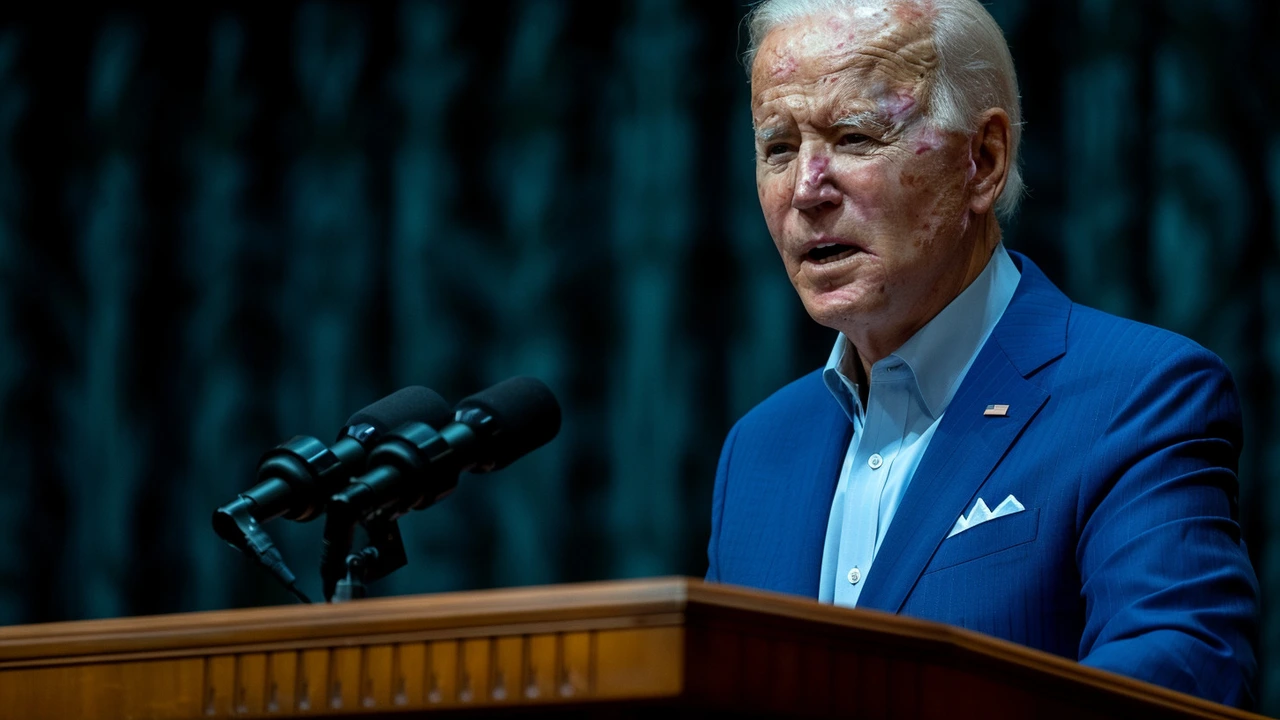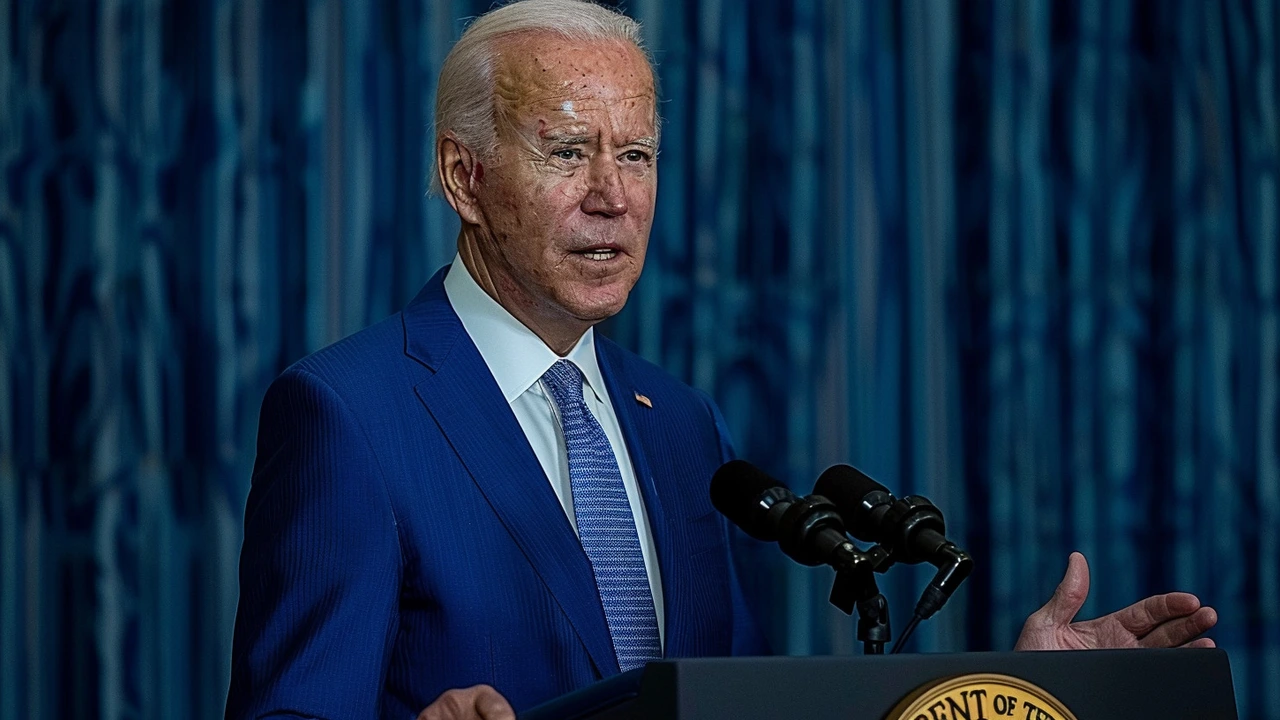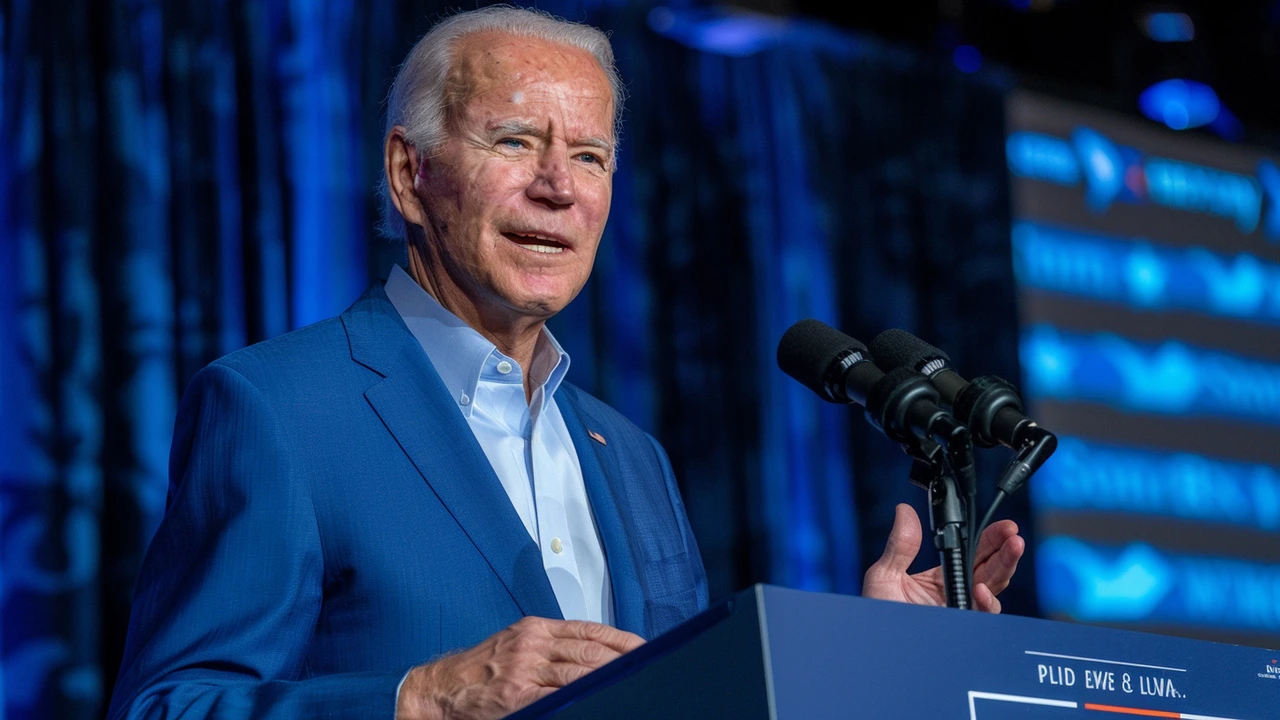Graceful Transition: Replacing Joe Biden as the Democratic Presidential Nominee

Joe Biden's Performance and the Need for a Change
The political world is buzzing with speculations about Joe Biden's future as the Democratic presidential nominee. His recent performance in a debate against Donald Trump has sparked concerns among Democratic circles. Joe Biden, who has been the face of the Democratic Party, may need to reconsider his position ahead of the upcoming election. Veteran Obama strategist David Axelrod believes that if there's a shift at the top, the Republicans could face significant challenges, especially with Trump as their frontrunner.
Biden's recent performances, including his debates and public appearances, have raised questions about his ability to lead a vigorous campaign. The Democrats need a candidate who can match Trump's energy and communication skills. Axelrod's insights into the party's strategy highlight the need for a candidate who can be agile and articulate, someone who can connect with the electorate and present a strong opposition to Trump. A graceful exit for Biden could pave the way for such a candidate.
The Political Strategy Behind Biden's Potential Exit
The process of replacing a sitting president nominee is intricate and requires careful planning. One crucial aspect is collaboration with First Lady Jill Biden. Jill Biden, being a significant influence in the president's life, will play a pivotal role in this decision. Furthermore, influential Democrats like former President Barack Obama and former House Speaker Nancy Pelosi must also be part of the dialogue. These key figures need to persuade Biden to step down gracefully and ensure that the transition is smooth and beneficial for the party.
Timing is everything in politics. If Biden chooses to withdraw before the Democratic National Convention in mid-August, it gives the party a chance to select a new nominee through his delegates' votes. This approach allows the party to harness the collective support and legitimacy of the delegates. On the other hand, if Biden steps down after the convention, the Democratic National Committee (DNC) would need to convene a special meeting to decide on the new nominee. Each scenario comes with its own set of challenges and advantages, but the goal remains the same: to present a united front and a strong candidate for the Presidential election.

Potential Successors and the Dynamics of Nomination
Should Biden decide to withdraw, several prominent figures could be considered for the nomination. Vice President Kamala Harris, who has been a significant figure in the current administration, stands out as a potential successor. Her experience and visibility on the national stage make her a strong candidate. California Governor Gavin Newsom, Michigan Governor Gretchen Whitmer, and Pennsylvania Governor Josh Shapiro are also potential contenders. Each of these leaders brings unique strengths to the table, and their regional influence could play a crucial role in the campaign.
A key part of Biden's potential departure strategy would be his involvement in anointing a successor. This approach allows him to maintain a degree of control and influence over the process, ensuring that his vision and policies continue to guide the party. By announcing his withdrawal well before the convention, Biden could build public support for a new nominee and solidify his legacy as a leader who put the party's needs above his own.
The Road Ahead: Strategy and Public Perception
The Democratic Party's strategy in handling this potential transition will significantly impact the outcome of the upcoming election. The key is to present a unified front and to ensure that the transition is as seamless as possible. Biden's withdrawal, if handled gracefully, could turn a potential weakness into a strength for the party. Public perception will play a crucial role in this process. The voters need to see this move as a strategic decision for the betterment of the party and the country.
Biden's legacy is also at stake. By opting for a controlled and dignified exit, he could ensure that his contributions and achievements are remembered positively. This move could also set a precedent for future political transitions, highlighting the importance of prioritizing the party's and the nation's needs over personal ambitions.

Final Thoughts
The possibility of Joe Biden stepping down as the Democratic presidential nominee is a complex and sensitive issue. It involves strategic planning, collaboration with key figures, and careful consideration of public perception. However, if managed correctly, it could turn out to be a game-changer for the Democratic Party. A new, dynamic candidate could bring renewed energy and focus to the campaign, significantly enhancing the party's chances in the upcoming election. As the political landscape continues to evolve, the next few weeks will be crucial in determining the future direction of the Democratic Party and the country.






Lauren Markovic
June 29, 2024 AT 20:13Wow, that breakdown is super helpful! The way you laid out the timing options makes it much clearer what the party could do. I think a graceful exit could actually boost Biden's legacy rather than tarnish it. 😃 It’s also good to see the mention of Jill’s role – she’s often overlooked in these discussions. Thanks for the thorough analysis, really appreciated!
Kathryn Susan Jenifer
July 9, 2024 AT 14:34Oh, so now we’re supposed to imagine a political sitcom where Biden hands the mic to anyone who can shout louder? The drama on stage was already a masterpiece of lagging speeches. If the Democrats want a “graceful” transition, they better start rehearsing the goodbye tour now. You can almost hear the applause track playing in the background.
Jordan Bowens
July 19, 2024 AT 08:55Biden's exit plan sounds like a political drama.
Kimberly Hickam
July 29, 2024 AT 03:17Let us consider the ontological ramifications of a strategically timed abdication. First, the very notion of leadership continuity becomes a construct of collective consent, rather than the singular charisma of an incumbent. Second, the party’s epistemic framework must pivot to accommodate emergent narratives that foreground agility over incumbency. Third, the optics of a dignified withdrawal can be weaponized by the opposition, turning vulnerability into a rallying cry. Fourth, the delegation calculus demands a meticulous reallocation of support, ensuring that any successor inherits a robust infrastructure. Fifth, Jill Biden’s influence, often relegated to the periphery, must be recognized as a pivotal catalyst in the decision-making matrix. Sixth, the temporality of the convention imposes a hard deadline that compresses strategic deliberations. Seventh, the media’s framing of such a transition can either legitimize or delegitimize the process. Eighth, the legacy metrics on which Biden's administration is judged will be inexorably linked to the manner of his departure. Ninth, the internal party dynamics, from the progressive wing to the establishment, will be tested for cohesion under the pressure of rapid realignment. Tenth, the electorate’s perception of unity versus chaos will shape the forthcoming campaign narrative. Eleventh, the successor’s own political capital must be assessed, not merely as a function of name recognition but also policy depth. Twelfth, the interplay between personal ambition and collective good illustrates a perennial tension in democratic institutions. Thirteenth, the legal mechanisms governing delegate reallocation demand scrupulous adherence to party bylaws. Fourteenth, the specter of a post-convention special meeting invokes procedural complexities that could either obfuscate or clarify the transition. Fifteenth, the strategic calculus must weigh the immediate electoral ramifications against long‑term ideological stewardship. Finally, the overarching moral imperative is that the party prioritize the democratic mandate over personal legacy, thereby ensuring that the transition, if executed with grace, becomes a benchmark for future political conduct.
Gift OLUWASANMI
August 7, 2024 AT 21:38Seriously, the whole “graceful exit” narrative is just elite theater. They act like a polite dinner party when the real power play is about who gets the spotlight next. The language is slick, but underneath it’s a battle for the party’s soul, and the average voter isn’t invited to the rehearsal.
Keith Craft
August 17, 2024 AT 15:59Ah, the drama of politics! One must acknowledge the gravitas of a departure enshrouded in dignity, yet the spectacle demands a chorus of whispers and ceremonial applause. In the grand tableau, the curtain falls not on a single actor but on the entire ensemble, each yearning for their moment under the incandescent lights. Let the world bear witness to this solemn procession.
Kara Withers
August 27, 2024 AT 10:20I appreciate the careful outlining of the procedural steps. It’s crucial for party members to understand the roles Jill, Obama, and Pelosi could play in facilitating a smooth handover. Transparency in the process will help maintain trust among the base and prevent speculation from spiraling out of control. Thanks for breaking it down so clearly.
boy george
September 6, 2024 AT 04:41Great insight but keep it short.
Cheryl Dixon
September 15, 2024 AT 23:02While many hail the idea of a smooth transition, one must question whether any “smoothness” is possible when the very foundation of the party is being reshuffled. A contrarian view suggests that forcing a change could fracture the coalition rather than unify it.
Charlotte Louise Brazier
September 25, 2024 AT 17:24Your point is well taken, and I’d add that decisive leadership can actually rally the base. An assertive approach to the transition might prevent the kind of indecision that fuels factionalism. Let’s channel that aggression into constructive momentum.
Donny Evason
October 5, 2024 AT 11:45The cultural implications of a leadership shift are profound. It isn’t just about policy; it’s about identity and representation on the global stage. A thoughtful recalibration could signal a renewed commitment to progressive values, while also respecting the historical contributions of the current administration.
Phillip Cullinane
October 15, 2024 AT 06:06Indeed, the strategic realignment must be anchored in a comprehensive stakeholder analysis, integrating both macro‑level electoral data and micro‑level constituency feedback loops. From a communications standpoint, the messaging architecture should prioritize narrative coherence, ensuring that the transition narrative aligns with the party’s broader policy platform. Moreover, the operational logistics-such as delegate reallocation protocols, fund redistribution mechanisms, and campaign infrastructure handovers-necessitate a meticulous project management framework. By leveraging data‑driven predictive modeling, the party can anticipate voter sentiment shifts and calibrate outreach initiatives accordingly. In essence, a multidimensional approach that synergizes political theory with pragmatic execution will safeguard both the party’s immediate electoral prospects and its long‑term ideological continuity.
Janie Siernos
October 25, 2024 AT 00:27From a moral standpoint, it would be irresponsible for any leader to cling to power beyond their effective capacity. Prioritizing the collective welfare over personal ambition is not just political prudence-it’s an ethical imperative.
joy mukherjee
November 3, 2024 AT 17:48Absolutely, ethical leadership should always come first 😊 It's tough to watch when personal ambition overshadows the public good, but it’s heartening to see calls for responsibility.
Rob Chapman
November 13, 2024 AT 12:09Philosophically speaking, the notion of a “graceful exit” reflects the dialectic between power and relinquishment. The party must reconcile its desire for continuity with the inevitability of change, crafting a synthesis that honours past achievements while embracing future possibilities.
Delaney Lynch
November 23, 2024 AT 06:31Well said!; Indeed, reconciling continuity and change is paramount; We must ensure the synthesis embraces both the legacy and the innovation!!!
Nicholas Mangraviti
December 3, 2024 AT 00:52Optimism is key-let’s turn this challenge into an opportunity.
Jared Greenwood
December 12, 2024 AT 19:13All this talk of “graceful exits” is just rhetoric; the nation needs strong, assertive leadership that puts American interests first, not endless debate.